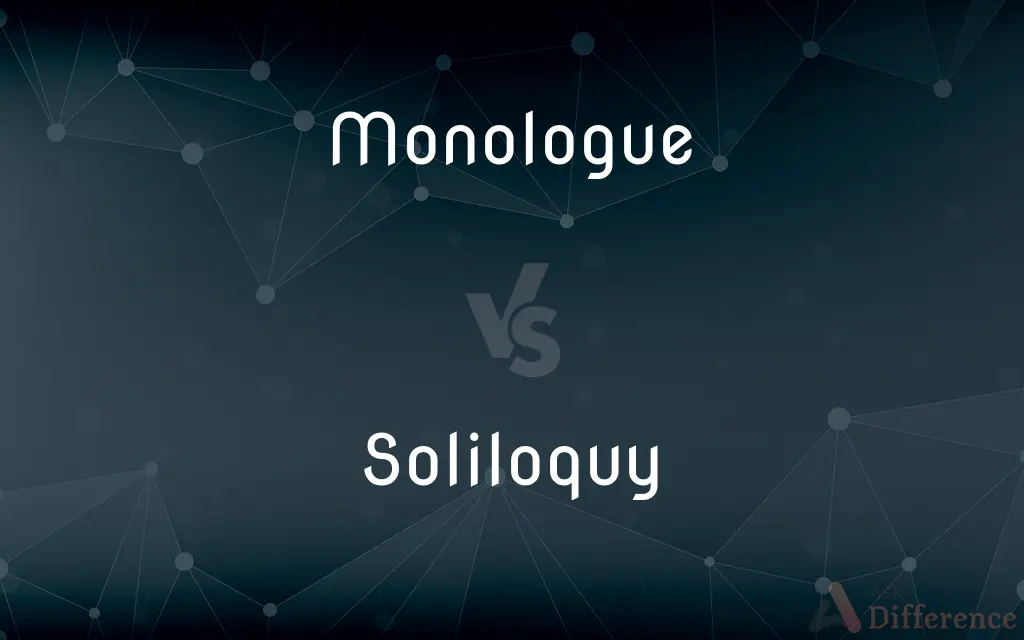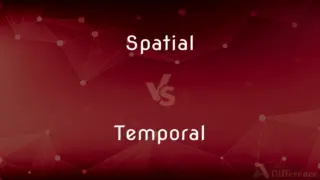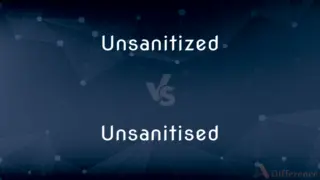Monologue vs. Soliloquy — What's the Difference?
Edited by Tayyaba Rehman — By Fiza Rafique — Updated on October 24, 2023
A monologue is a prolonged speech by one person, often addressing others; a soliloquy is a character's inner thoughts spoken aloud, typically when they're alone on stage.

Difference Between Monologue and Soliloquy
Table of Contents
ADVERTISEMENT
Key Differences
A monologue is a continuous speech or narrative delivered by a single character in a play, movie, or any other theatrical performance. On the contrary, a soliloquy is a type of monologue where a character speaks to themselves, expressing their inner thoughts and feelings.
In the context of theatre, when an actor delivers a monologue, they might be addressing other characters on stage or the audience directly. However, during a soliloquy, the character is usually alone on stage, sharing their innermost thoughts without necessarily addressing anyone.
Both monologues and soliloquies serve essential purposes in storytelling. A monologue can provide a deep insight into a character's background, motivation, or perspective. In contrast, a soliloquy gives the audience a window into a character's soul, showcasing their dilemmas, desires, and internal conflicts.
It's not uncommon for people to confuse monologues with soliloquies since they both involve lengthy speeches by a single person. However, the key difference lies in the intent and audience; while a monologue often communicates with others, a soliloquy is more introspective.
In modern contexts beyond theatre, monologue can refer to any extended speech by a single person, such as a comedian's routine or a prolonged speech in a conversation. Meanwhile, the term soliloquy remains mostly confined to the realms of drama and literature, indicating a character's self-talk.
ADVERTISEMENT
Comparison Chart
Definition
Prolonged speech by one person
Character's inner thoughts spoken aloud
Audience
Other characters or audience
Usually none, character is often alone
Purpose
Provide background, motivation, or perspective
Showcase innermost feelings, dilemmas, desires
Interaction
Might address others
Typically introspective
Modern Context
Extended speech in various situations
Mostly confined to drama and literature
Compare with Definitions
Monologue
An uninterrupted series of remarks or ideas.
His monologue about politics lasted for hours.
Soliloquy
A literary or dramatic form resembling a monologue.
The novel included a soliloquy where the hero pondered his destiny.
Monologue
A literary composition in the form of a soliloquy.
The poem was written as a monologue from the perspective of the moon.
Soliloquy
A speech in a drama where a character talks to themselves.
Hamlet's To be or not to be is a famous soliloquy.
Monologue
A prolonged speech in a conversation, overshadowing others.
She went on a monologue about her vacation adventures.
Soliloquy
A character expressing inner thoughts aloud when alone.
Her soliloquy revealed her deep uncertainties about the future.
Monologue
In theatre, a monologue (from Greek: μονόλογος, from μόνος mónos, "alone, solitary" and λόγος lógos, "speech") is a speech presented by a single character, most often to express their thoughts aloud, though sometimes also to directly address another character or the audience. Monologues are common across the range of dramatic media (plays, films, etc.), as well as in non-dramatic media such as poetry.
Soliloquy
A device used to convey a character's internal struggles.
The play used a soliloquy to show the protagonist's guilt.
Monologue
A long speech by one actor in a play or film, or as part of a theatrical or broadcast programme
He was reciting some of the great monologues of Shakespeare
He had a long and exacting monologue at the end of the film
Soliloquy
A soliloquy (, from Latin solo "to oneself" + loquor "I talk", plural soliloquies) is a monologue addressed to oneself, thoughts spoken out loud without addressing another.Soliloquies are used as a device in drama to let a character make their thoughts known to the audience, address it directly or take it into their confidence. English Renaissance drama used soliloquies to great effect, such as in the soliloquy "To be, or not to be", the centerpiece of Shakespeare's Hamlet.
Monologue
A lengthy, uninterrupted speech by a single character, as in a play or novel.
Soliloquy
An act of speaking one's thoughts aloud when by oneself or regardless of any hearers, especially by a character in a play
He did most of his thinking by soliloquy
Edmund ends the scene as he had begun it, with a soliloquy
Monologue
A literary composition in monologue form.
Soliloquy
A monologue, especially in a play, that is delivered by a character who is alone or unaware of the presence of other characters and that reveals the thoughts or feelings of that character.
Monologue
A continuous series of jokes or comic stories delivered by one comedian.
Soliloquy
The act of speaking to oneself.
Monologue
A long speech made by one person, often monopolizing a conversation.
Soliloquy
(drama) The act of a character speaking to themselves so as to reveal their thoughts to the audience.
At the end of the second act the main villain gave a soliloquy detailing his plans to attack the protagonist.
Monologue
To give or perform a monologue.
Soliloquy
(authorship) A speech or written discourse in this form.
Monologue
To address a monologue to.
Soliloquy
To issue a soliloquy.
Monologue
A long speech by one person in a play; sometimes a soliloquy; other times spoken to other characters.
Soliloquy
The act of talking to one's self; a discourse made by one in solitude to one's self; monologue.
Lovers are always allowed the comfort of soliloquy.
Monologue
(comedy) A long series of comic stories and jokes as an entertainment.
Soliloquy
A written composition, reciting what it is supposed a person says to himself.
The whole poem is a soliloquy.
Monologue
A long, uninterrupted utterance that monopolizes a conversation.
Soliloquy
Speech you make to yourself
Monologue
To deliver a monologue.
Soliloquy
A (usually long) dramatic speech intended to give the illusion of unspoken reflections
Monologue
A speech uttered by a person alone; soliloquy; also, talk or discourse in company, in the strain of a soliloquy; as, an account in monologue.
Soliloquy
An act of speaking one's thoughts regardless of hearers.
Lost in thought, he began a soliloquy about life's meaning.
Monologue
A dramatic composition for a single performer.
Monologue
Speech you make to yourself
Monologue
A long utterance by one person (especially one that prevents others from participating in the conversation)
Monologue
A (usually long) dramatic speech by a single actor
Monologue
Extended speech by a single speaker in a drama or narrative.
The villain's monologue revealed his plan to the heroes.
Monologue
A comedic routine or speech by a solo performer.
The comedian opened the show with a hilarious monologue.
Common Curiosities
Why are soliloquies used in plays?
Soliloquies give insight into a character's inner thoughts and emotions.
Is every soliloquy a monologue?
Yes, every soliloquy is a type of monologue, but not every monologue is a soliloquy.
Are soliloquies common in modern plays?
While less common than in classic plays, soliloquies still appear in modern drama.
Are soliloquies realistic in representing human thought?
While stylized, soliloquies aim to capture the essence of inner contemplation.
Can a monologue be addressed to the audience?
Yes, monologues can be addressed directly to the audience.
How long is a typical monologue?
Length varies; it can be brief or extend for several minutes.
Can a monologue be comedic?
Yes, monologues can be comedic, dramatic, or anywhere in between.
Who typically delivers a soliloquy in a play?
Any character can deliver a soliloquy, often the protagonist or a key character.
Can a monologue be in a non-theatrical context?
Yes, monologues can appear in narratives, stand-up routines, or even casual conversations.
What's the main goal of a monologue?
To provide insight, background, or perspective through a single character's speech.
Can two characters have a monologue together?
No, by definition, a monologue is delivered by a single person.
How do I identify a monologue in a text?
Look for an extended speech by a single character without interruption.
Can soliloquies appear outside of plays?
Yes, they can be found in novels, poems, and other literary forms.
Do soliloquies break the fourth wall?
Not necessarily, though they do directly address the audience in some instances.
Why might a playwright choose a soliloquy over a monologue?
To focus on a character's internal dialogue and deeper emotions.
Share Your Discovery

Previous Comparison
Spatial vs. Temporal
Next Comparison
Unsanitized vs. UnsanitisedAuthor Spotlight
Written by
Fiza RafiqueFiza Rafique is a skilled content writer at AskDifference.com, where she meticulously refines and enhances written pieces. Drawing from her vast editorial expertise, Fiza ensures clarity, accuracy, and precision in every article. Passionate about language, she continually seeks to elevate the quality of content for readers worldwide.
Edited by
Tayyaba RehmanTayyaba Rehman is a distinguished writer, currently serving as a primary contributor to askdifference.com. As a researcher in semantics and etymology, Tayyaba's passion for the complexity of languages and their distinctions has found a perfect home on the platform. Tayyaba delves into the intricacies of language, distinguishing between commonly confused words and phrases, thereby providing clarity for readers worldwide.
















































